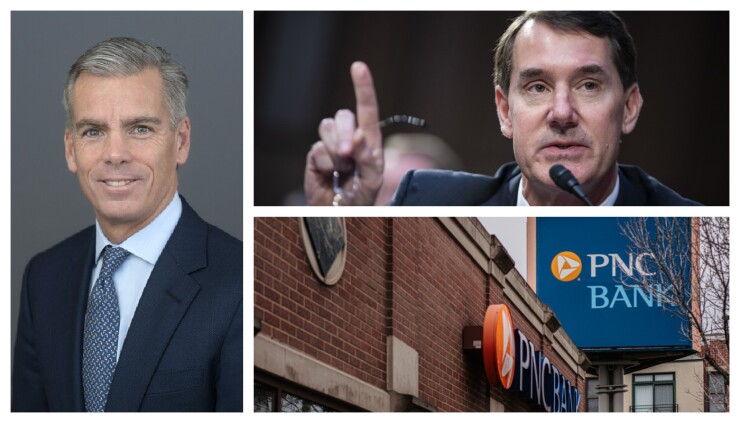Want unlimited access to top ideas and insights?

The $562 billion-asset company said Tuesday that Michael Lyons has been promoted to president, succeeding William Demchak, who remains chairman and CEO. Lyons reports to Demchak and oversees PNC's primary operating lines of business. PNC's regional presidents will report to Lyons.
Lyons, 53, had been head of corporate and institutional banking since he joined Pittsburgh-based PNC in October 2011. During his tenure, Lyons helped lead PNC's
"He's been with us for 13 years, successfully building businesses and executing our organic growth plan," Demchak, who was American Banker's
Analysts said Lyons' promotion positions him to become PNC's next CEO.
Lyons is "a highly regarded executive who has been instrumental in advancing PNC's strategy and acquisitions," Piper Sandler analyst Scott Siefers said in a report. His promotion "will solidify in investors' minds the impression" that Lyons would eventually succeed Demchak.
Stephens analyst Terry McEvoy offered a similar take. Lyons "has been very visible and worn multiple important hats and been in charge of meaningful lines of business for PNC," he said in an interview. "This was not a surprise. … It is appropriate to deepen the leadership bench and show succession planning."
Demchak said he has no near-term plan to retire, but he did not discourage the succession-plan view. "There's no clock that's ticking," he said. But "we wouldn't have put Mike in the seat if we didn't have high hopes."
Prior to PNC, Lyons was global head of corporate development and strategic planning for the
Lyons moves into the president role at a time when PNC is shifting from an expense-control mindset amid the high interest rates and lofty deposit costs of 2023 to a more aggressive strategy.
The company earlier this month said it would renovate more than 1,200 existing offices and
"Nothing's broken. We'll just have more amped up execution" on growth plans in the year ahead and beyond, Lyons said in an interview.
Last year, PNC shuttered some branches and
But in 2024, Lyons said, the company will push for deposit growth in major markets with new branches while also building out revenue-driving business lines by recruiting new talent and investing in technology.
Demchak said he anticipates that the Federal Reserve could cut interest rates three times in the second half of 2024, helping to ease pressure on deposit costs. That, combined with loan growth and expansion of other products, should drive stronger net interest income levels in coming years.
"2025 will be a record year for NII," Demchak predicted for PNC.
He said PNC, given its scale and geographic reach, is well positioned to win market share from other banks that are downsizing or selling to peers. He referred to news Tuesday of Charlotte, North Carolina-based Truist's decision to sell its remaining
"The banking industry is in flux," Demchak said. "Our intention is to go take advantage of it."
Demchak said bank M&A may also be in the cards for PNC, though the bank will be patient. "I think we will have opportunity for acquisitions," he said. "But we aren't going to force it."
PNC in January reported fourth-quarter
The decline was due in part to a $515 million charge to help replenish the Federal Deposit Insurance Corp.'s Deposit Insurance Fund following the failures of three regional banks last year.
The bank reported adjusted earnings per share of $3.16, which was still below the year-earlier level by 9%, as revenue declined 7% to $5.4 billion. Hampered by high rates, increased funding costs and flat lending, PNC's net interest income fell 8% to $3.4 billion.
But executives said that, given the resilience of the national economy and strong activity in growth markets, they expect PNC to be more profitable in 2024.





